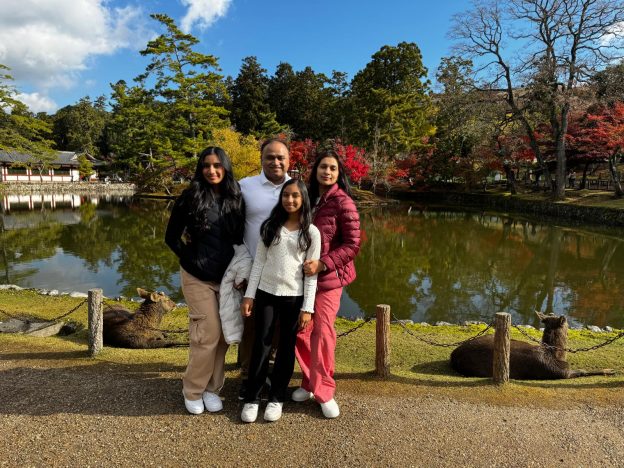
Five questions for … Dr. Aniket Kawatkar
Aniket Kawatkar, PhD, MS, is a research scientist who is interested in understanding the drivers of health care utilization and their associated economic, clinical, and patient-reported outcomes. Dr. Kawatkar uses established methods from econometrics, discrete choice experiments, and net benefit analysis to evaluate interventions and treatments aimed at improving patient care in real-world clinical settings. He has been a scientist at within the Department of Research & Evaluation since 2009 and works in the Division of Health Services Research & Implementation Science.
Why did you pursue health research?
My interest in science grew in high school chemistry and biology, where I became fascinated by how molecules interact with the body. Understanding how medications affect health sparked my desire to pursue pharmacy, and I was further drawn by its career stability, diverse paths, intellectual challenge, and flexibility. My clinical background and training in pharmacy naturally positioned me for a career in health care research. After completing my pharmacy degree, I decided to further my education and pursue an advanced degree in a field that integrates pharmacy with data-driven decision-making. I completed my MS in pharmacy with a focus on the social and behavioral aspects of pharmacy practice and management. During this time, I became increasingly drawn to advanced statistical modeling, particularly in econometrics. This interest led me to apply for PhD programs that emphasize both theoretical and applied econometrics in the context of pharmacy. After careful consideration, I found that the coursework and faculty at University of Southern California’s Pharmaceutical Economics and Policy program offered the perfect fit for my aspirations in health economics. I had been living in Houston, Texas, so additionally, the opportunity to be in Southern California, with its Mediterranean climate, vibrant academic community, and quality of life, solidified my decision.
What research are you most proud of?
I take great pride in my research that applies advanced causal inference methodology for comparing effectiveness, which I developed in my dissertation published in Health Economics and Health Services and Outcomes Methodology.
In healthcare, decision-makers often need to compare different treatment options. This is tricky because treatments aren’t randomly assigned, leading to selection bias, which can distort the true effects of treatments. Traditionally, instrumental variables have been used to reduce this bias, but they usually only compare two treatments at a time.
To solve this, I proposed a new method using a control-function correction in a correlated random coefficients model with panel data. This approach handles multiple treatments, accounts for changes over time, and considers individual differences in treatment effects. It aims to provide a more accurate evaluation of treatment options, improving patient outcomes and the quality of care.
Your area of research that evaluates treatments for both economic and health benefits is unusual. Why are the economics of health treatment important?
Health economics is a branch of economics that focuses on how health care resources are allocated, the efficiency of health care systems, and the impact of health care policies on individuals, society, and the economy. It integrates economic theory, empirical analysis, and health policy to examine how scarce resources—such as costs, labor, and time—are distributed and utilized within the healthcare sector.
While the field of health economics covers a wide range of topics, my personal interests lie in the following areas:
- Evaluating the costs and benefits of various health care interventions or treatments, helping to determine the most efficient allocation of resources.
- Analyzing patient preferences so that health care providers and policymakers can make more patient-centered decisions, ensuring treatments align with what patients truly value.
- Determining the trade-offs patients are willing to make so that health care systems can allocate resources more effectively.
In general, health economics is vital for making informed decisions that optimize the effectiveness and efficiency of health care systems. By evaluating both costs and outcomes, health economics contributes to better healthcare policies, interventions, and overall health improvements.
What research do you hope to conduct or complete next?
My current research focus is the emerging field of cardio-oncology, a specialized field of medicine that focuses on the cardiovascular health of patients with cancer The overarching goal of my National Heart, Lung, and Blood Institute-funded R01 grant is to identify and characterize cancer patients at risk of developing cancer treatment-related heart damage, and to mitigate heart issues while optimizing cancer outcomes. Advances in the early detection and treatment of cancer have significantly improved 5-year survival rates. However, multi-modal cancer treatments often result in heart damage, which can complicate patient care. Cardiovascular disease (CVD) events during cancer treatment can interfere with the delivery of these treatments, potentially leading to poor cancer outcomes. Additionally, such events contribute to increased illness, health care costs, and deaths. Addressing these risks is crucial for enhancing both the quality of life and the long-term health of cancer survivors. Our study will compare effectiveness of primary prevention pharmacological therapy on cancer and CVD outcomes during chemotherapy as well as cancer and CVD outcomes post- chemotherapy in adults with breast cancer. We also will evaluate the impact of primary prevention pharmacological therapy on financial toxicity and disability in adults with breast cancer. We hope the findings will help guide health care policy on primary prevention in cardio-oncology, improve patient outcomes, and identify subgroups of who may benefit the most from primary prevention pharmacologic therapy.
What do you like to do in your spare time, while not at work?
In my spare time, I love to travel and explore new countries, cultures, and cuisines. It’s always exciting to experience different ways of life and try new foods.
I also cherish my time as a parent, especially when I get to drive my 2 performing arts-loving kids to their extracurricular activities and classes. Watching them grow and develop their talents is incredibly rewarding, and it’s always a joy to be part of their creative journeys.
Caption: Dr. Kawatkar’s wife, Ami, and daughters, Aariya and Aaricia at Deer Park in Nara, Japan





